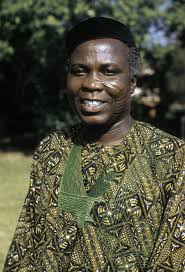 |
| Chief Samuel Akintola |
 |
| Tafewa Balewa |
After Nigeria gained independence from the UK, its domestic politics TRIED to emulate that of its former colonial master by adopting a Westminster-style, parliamentary democracy. There the similarities ended. Instead of the cultured debate and sophisticated party political culture of the UK, Nigeria’s politics fragmented on regional and ethnic lines. Due to the splitting of the country into three geopolitical regions, party politics (and political parties) took on the identity and ideology of each of the three regions. The Northern Region was represented by the Northern People’s Congress (NPC) whose motto of “one north, one people” gave a realistic and accurate assessment of its objectives. Southerners viewed the NPC as the party of the Hausa-Fulani. The Western Region’s dominant party was the Yoruba-led Action Group (AG) and the East’s the National Council of Nigerian Citizens (NCNC), which was controlled by the Igbo. These regional-based parties assured two things: first, that none of the parties could govern Nigeria on its own and, secondly, that ethnic conflict was only a matter of time away.
The NPC took control of the Federal Government with the NCNC as the junior partner in a shaky coalition (NPC’s deputy head Tafewa Balewa became the Prime Minister and NCNC’s leader Dr Nnamdi Azikiwe took the ceremonial role of President). The AG led the opposition.
 |
| Dr Nnamdi Azikiwe |
 |
| Sir Ahmadu Bello |
The makeup of the Government was odd. The NPC’s leader, Sir Ahmadu Bello, could have become Prime Minister but, instead, he chose to become leader of the Northern Region and handed over the Prime Minister’s chair to his deputy, Tafewa Balewa. Rightly or wrongly, many southern politicians viewed Balewa as Bello’s puppet and resented the fact that (in their opinion) the government was being ruled by proxy by a regional ruler and viewed Bello as the real power beyond the throne. This may have led southern politicians to have a disrespectful attitude toward Balewa. This perception was not helped when Bello referred to Balewa as “my lieutenant in Lagos.”
At Independence, the Northern Region was given more seats in Parliament that the two southern regions put together. This meant that no meaningful governmental decision affecting Nigeria could be taken without the consent of the North. Southern rulers belatedly began to appreciate that Northern politicians were not as naïve as they had thought and that the lopsided Parliament meant that the North would politically control Nigeria forever. The only way to alter the North’s control of the country was via a constitutional amendment (unlikely since the North controlled the Parliament ) or violence.
 |
| Chief Obafemi Awolowo |
The conviction and imprisonment of the AG leader and Western Region Premier, Chief Obafemi Awolowo, for treason seemed to suggest that some southerners had chosen the latter option. In a controversial trial, Awolowo was convicted of hatching a plot to overthrow the government by force of arms. Awolowo’s incarceration was followed by the installation an unpopular government led by Chief Samuel Akintola of the NNDP. The NNDP had very close links to the ruling NPC and was regarded by many as a local western “branch” of the NPC. Akintola was elected as Premier of the Western Region in a bitterly controversial election that was widely regarded as massively rigged. Popular resentment against the NNDP spilled over into widescale violence, protests, arson, and murders that placed many parts of the Western Region into a state of near anarchy which earned the region the nickname of the “Wild West.” ...stay tuned










Comments
Post a Comment